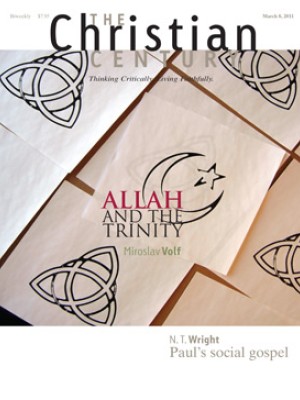Living traditions

I read the Wall Street Journal not daily but frequently, and while I appreciate the breadth of the coverage and the quality of the writing, I often find something to fuss with on the editorial pages. In the case of Russell D. Moore's article "Where have all the Presbyterians gone? Nondenominational churches are the fastest growing in the country," it seemed again as if the paper's editors, particularly the one who created the headline, are gleeful about the travails of mainline Protestant churches. And it appears that someone has decided that Presbyterianism can stand for what is wrong in mainline churches, especially with their propensity to adopt progressive political views—in opposition to the Journal's.
Despite the headline, Moore, dean of the Southern Baptist Theological Seminary in Louisville, Kentucky, never mentions Presbyterians except in a list of denominations with which fewer and fewer American Christians identify. "Are we witnessing the death of America's denominations?" Moore asks, and he points out that "more and more Christians choose a church not on the basis of its denomination" but on the basis of practical matters such as the nursery and the music. This is not new information. Every sociologist of religion I know relates that shift to our individualistic, consumer culture.
Read our latest issue or browse back issues.
In The Jesus Way, Eugene Peterson says that "the great American innovation in congregation is to turn it into a consumer enterprise. It didn't take long for some of our brothers and sisters to develop consumer congregations . . . [that convey] the gospel in consumer terms: entertainment, satisfaction, excitement, adventure, problem solving, whatever." But as Peterson concludes, "This is not the way God brings us into conformity with the life of Jesus."
Moore claims that the huge success of the nondenominational megachurch is "a natural extension of the American evangelical experiment." I don't think so. I think it's about smart marketing and multiple options. Moore says post-World War II evangelicals and revivalists saw churches shift from sending missionaries to producing position papers on energy policy. That's a cheap shot. And even his denomination is starting to pay attention to the care of God's creation.
Moore points out that along with the growth of nondenominational churches, Southern Baptists have become the nation's largest Protestant denomination. Then he comes to the bottom line: "Many of us believe denominations can represent fidelity to living traditions of local congregations that care about what Jesus cared about—personal conversion, discipleship, mission and community." Moore is confident that such is the case with the Southern Baptist Convention.
Many of us love the denominations that nurtured us, introduced us to Jesus and taught us how to follow him. We're part of families of faith with distinct customs, vocabularies and traditions of music. We try to express our discipleship in ecclesiastical structures that may not be as slick or as nimble as some independent enterprises—but we're trying to be faithful partners with thousands of other congregations that are trying to be faithful in the settings in which they find themselves, however difficult.
I'm weary of being lectured about what's wrong with mainline churches, but grateful for signs of honest inquiry and discernment from those in my church and others. And I'm grateful for Moore's hopeful conclusion: "Perhaps the denominational era has just begun."







